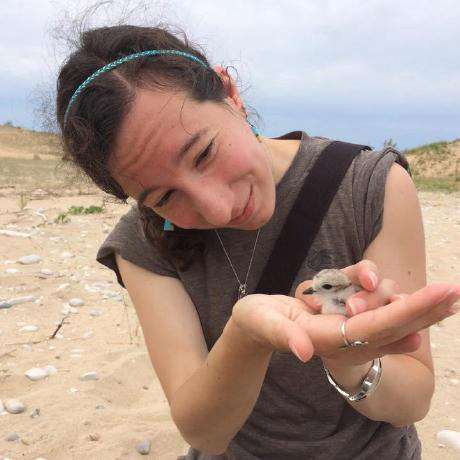
Dr. Sarah P. Saunders, postdoctoral research associate in the Department of Integrative Biology, believes that inspiration often comes when it is least expected. In her case, it came in the form of a pigeon.
“During college, I had a summer internship at World Bird Sanctuary outside of St. Louis, and one of my tasks was to clean the pigeon loft each week,” Saunders said. “On a particularly hot summer day in the pigeon loft, I watched a single bird search among a pile of sticks, retrieve a suitable specimen, and return it to his mate to construct her nest. He repeated this process for over an hour. This pigeon captured my curiosity that day, reminding me that every animal is a unique individual with a distinct personality. No matter how different pigeons and humans are evolutionarily, we are connected by our common basic behaviors, such as providing for our mates. Although I have always been interested in the biology of animal behavior, it was this realization that instigated my passion for conservation biology.”
Saunders received her bachelor’s degree in Biology from Washington University in St. Louis in May 2010. Following graduation, she began her PhD with Dr. Francesca Cuthbert at the University of Minnesota and completed her degree in March 2015. While a graduate student, Saunders also served as a conservation intern at the Minnesota Zoo for one year, studying tiger breeding success and cub survival. Saunders joined the lab of Dr. Elise Zipkin at MSU shortly thereafter, studying the dynamics of the eastern North American monarch butterfly population in the Department of Integrative Biology.
Since starting at MSU in the spring of 2015, Saunders has had five manuscripts published or in review, adding to her previous eight publications and six invited talks. Saunders successfully received independent funding from the United States Fish and Wildlife Service through the Great Lakes Restoration Initiative Grant, and also was the co-author with her PI, Dr. Zipkin, on a major NSF grant that was recently awarded.
“Sarah is among the most talented, hardworking, and motivated young scientists I have ever met,” Zipkin said. “In addition to being highly productive, Sarah is extremely likeable, helpful to the graduate students in our lab, and a natural leader among her peers. She has an excellent future ahead of her.”
Her current research focuses on adapting cutting cutting-edge quantitative techniques for biological conservation. She is building integrative models which synthesize multiple data types and sources of uncertainty into a unified structure to assess future population viability and efficacy of potential management strategies for piping plovers – the birds she studied for her PhD at the University of Minnesota – and American woodcock, a game species of conservation concern. This research will provide a comprehensive framework for analyzing data on threatened populations and shaping conservation actions at regional to continental scales. Saunders said her research has helped shed light on ecological mysteries, aid in recovery of endangered populations, reveal mechanisms of species invasion, and address urgent conservation priorities.

“Effective species conservation depends upon understanding factors driving changes in population abundance and distribution through the advancement of statistical models, and developing and linking management approaches to empirical data to alleviate threats to species persistence,” Saunders said. “This two-part research goal has been, and will continue to be, my motivation throughout my scientific career. I plan to continue my development as a quantitative conservation biologist in a research agency. I am interested in working in either a government or non-government organization where the mission is focused on advancing wildlife conservation through rigorous scientific monitoring and research. I have really enjoyed working with long-term monitoring data and I hope to continue to do so to better understand the dynamics of threatened and declining populations.”
Outside of the lab, Saunders has been co-instructor for the graduate level Quantitative Methods in Ecology and Evolution course, developing course lectures, assignments, and in-class activities to enhance student learning. She is currently supervising and mentoring several graduate students in the Zipkin lab on a project for the Reproducible Quantitative Methods course that seeks to model population dynamics of game species of conservation concern.
The MSU Postdoctoral Excellence in Research Award is a $1,000 cash award. Saunders said she plans to use her award to purchase a new laptop computer with more advanced computational abilities.
“I am very honored to receive a 2017 MSU Postdoctoral Excellence in Research Award,” Saunders said. “I am most passionate about being able to directly impact the recovery of endangered and declining populations, whether it is through statistical modeling, publications, or on-the-ground management actions. Receiving this award means that others are just as excited about my research, and its importance to animal conservation, as I am. I love being able to help solve pressing ecological problems and this award further encourages me to keep developing statistical models to better understand the dynamics of at-risk populations across the United States.”


